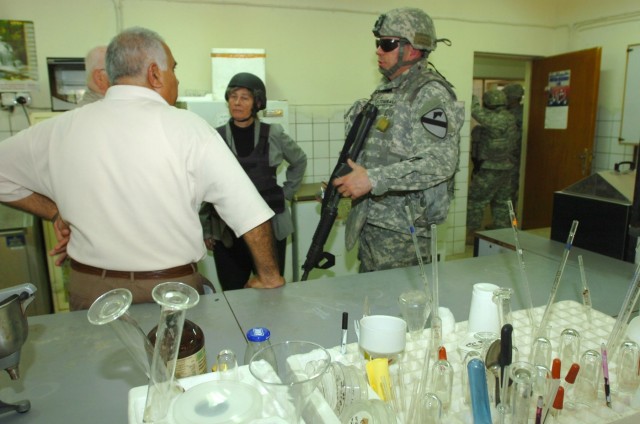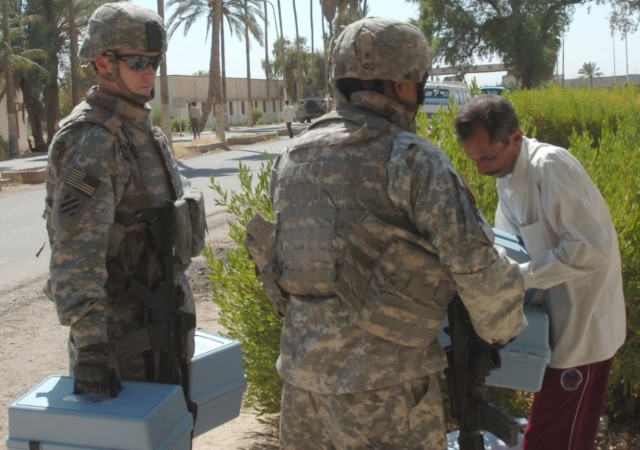ABU GHRAIB, Iraq - The 1st "Ironhorse" Brigade Combat Team, 1st Cavalry Division recently took a step towards advancing the future of farming in Iraq through helping the country's agricultural scientists at a major university here.
Soldiers from the brigade along with members from the brigade's Embedded Provincial Reconstruction Team and civil affairs office linked up with two scientists from the U.S. Department of Agriculture in the Green Zone in Baghdad to deliver soil testing kits to faculty members of the University of Baghdad's College of Agriculture here Sept. 22.
The delivery included 17 soil testing kits and a water analysis machine to professors and other faculty members at the college. The kits and a water analysis machine will allow the scientists to use up to date equipment to improve their efforts in advancing agriculture in Iraq.
According to Lt. Col. Harvey Fitzgerald, senior agri-business advisor for the Ironhorse Brigade EPRT, much of the work with agriculture in the area is being accelerated due to the success of local reconciliation efforts.
"We're providing pieces of the puzzle for reconciliation and there's lots of momentum right now, specifically through trying to find opportunities to strengthen agricultural economy and we're trying to make sure that the Iraqi system is successful," said Fitzgerald, who hails from Hermosa, S.D. "Today, we're providing them with soil testing kits that will allow them to have the latest in soil testing technology and help them with the planning of their resources for the fall planting season."
The test kits will allow the Iraqi agriculturalists to test the overall composition of the soil to examine nitrate and phosphate levels and evaluate whether the soil is good for farming.
The day's visit to the college marked the first time USDA representatives have traveled to meet with the faculty on the university campus which boasts 14 laboratories and a dairy research facility within its College of Agriculture.
"We have met with them (the college faculty) at the Ministry of Agriculture building before but we wanted to do a face to face with our friends at their university," said Dr. Rebecca Burt, a USDA soil science advisor. "We consider them important partners and we're optimistic about this first big step through this visit to their home turf."
During their meeting, the college faculty, USDA representatives and Ironhorse Brigade personnel discussed various issues concerning the running of agriculture programs at the university. Some topics discussed included the replacement of lab equipment which was stolen three years ago and training on new pieces of equipment that the college's labs will be receiving.
"We will work with them to identify their needs and address their issues, working hard to help them resolve their problems," added Burt. "We want to see them succeed at (taking over their own agricultural efforts) and we have a wealth of experts who can help them do just that."
Reconciliation efforts helped to facilitate the meeting on the campus, according to Capt. Mark Finnegan, Ironhorse Brigade's deputy civil affairs officer.
"Security has greatly improved in Abu Ghraib thanks to reconciliation efforts and the (college faculty) who were once worried about meeting with us on the campus, have not seen any significant acts of violence in nearly five months," said Finnegan, who hails from Pittsburgh, explaining some of the significance of the meeting.
Following the meeting with the agriculture faculty, the USDA members and Ironhorse troops were taken on a tour of the college's dairy research facility and lab.
Working with the USDA, the Ironhorse EPRT and civil affairs personnel have been coordinating with local government officials within the Ironhorse area of operations, to include Abu Ghraib, to improve the agricultural economy for farmers.
"We're currently working a number of things to help them create farmer's associations which are organizations made up of farmers that report to the government of Iraq," said Fitzgerald. "These organizations help farmers by serving as a conduit between the Iraqi Director General of Agriculture and the producers and will assist them in seed, fertilizer and chemical purchases."
"Along with that we will help them with input on how to sell a large part of their output," added Fitzgerald.
Recent improvements in security will help not just agriculture in the area but continue to move other local governance and reconstruction projects along as well, according to Finnegan.
"Reconciliation is helping accelerate our persistent efforts to help the Iraqis become self-reliant and improve governance, economics and essential services in the Abu Ghraib area," said Finnegan.




Social Sharing